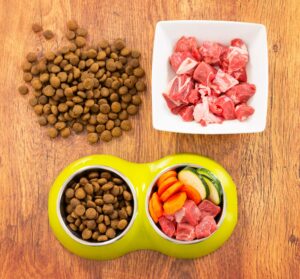Mealtimes at their best are a source of joy for owners and dogs alike. Dogs love being fed (who doesn’t?), and is there anything more adorable than a dog chowing down during mealtime?
Of course, mealtime can go from joyous to frustrating all too quickly if you don’t have the right food for your dog. After all, few things are more important for taking care of your dog than making sure they have the best food to eat. Sure, your dog may technically be able to “survive” on any old kibble, but that’s hardly indicative of a healthy or happy existence for them.
Instead, you need to ensure that your dog is getting high-quality dog food matching their specific tastes and dietary needs.
The big question is – are you better off making that food yourself or buying it at the store?
Homemade Dog Food 101
Until the advent of mass-produced dog food several decades ago, most dog foods were homemade. Today, homemade dog food is seen as the more “bespoke” and “specialized” option of the two.
If your dog has special dietary needs, or you want to customize what food they’re getting to best suit their nutritional needs and tastes, there are limits to what store-bought dog food can do.
On the other hand, homemade dog food can allow you to mix and match meats and veggies of all kinds, serving up one canine a la carte recipe after another.
If you do opt for homemade dog food, you’ll want to be careful to avoid the temptation to feed your dog scraps of meat. While dogs love meat and need it to remain healthy, the best dog diets contain many more than that. Ideally, your dog should also be getting a decent helping of veggies, vitamins, and additional supplements such as Omega-6, which can help keep your dog’s skin and coat to be smooth and healthy. Additionally, you’ll want to make sure that the meat you feed your dogs is as lean and free of trans fats as possible.
You may also want to look into giving your dog added supplements such as phytoplankton and recreational dog bones, which can help clean your dog’s teeth and keep them strong.
Finally, you’ll want to remember that a dog’s diet will depend on many factors, such as their age and breed. A golden retriever will have different nutritional needs than a chihuahua, and puppies from either of those breeds will have different nutritional needs than their older counterparts. For example, puppies need more calories, and older dogs need softer food for their weaker teeth. Making everything yourself means being able to address your dog’s every nutritional need on a personal basis.
Store-Bought Dog Food 101

That said, making food from scratch takes time. What if you don’t have half an hour every day or a few hours every weekend to make new food for your dog from scratch? What if you’re not much of a cook?
This is where store-bought food comes in. While homemade dog food may be more customizable, store-bought dog food is easily more convenient. All you do is buy it at the store, make sure it’s stored properly, serve it to the dog, and let them enjoy it while you go about your day.
What’s more, store-bought dog food has come a long way in recent decades. Where once the dog food industry was dominated by dry, basic, nutrient-poor kibble, today there is a wide range of dog food options that offer nutrient-rich healthy alternatives at an affordable price.
The advancements in dog food over the past few decades have been made possible by experts optimizing the food formulas. The best dog foods aren’t simply a few basic ingredients you could easily make yourself shoved into a can, but rather the result of a careful formulating and optimizing process designed to give dogs the best nutritional content possible. By contrast, when you make food on your own, unless you are an expert, you’re largely flying blind, or at best, going off the advice of others. With the best store-bought dog food, you have the assurance of knowing it has been formulated by experts to be among the best nutritional options for your dog.
Finally, the best dog food tends to come in cans or other durable sealed containers. These are a lot easier to store and transport than plastic bags with food morsels you’ve made yourself.
Homemade Dog Food Pros
The most obvious benefit of going with homemade dog food, as stated, is that you have total control over the ingredients. Having a greater amount of control over your dog’s food can ensure that it is as healthy as possible. Today’s best dog food brands have come a long way and offer healthy alternatives, but no company is perfect, and the potential for problems with their food supply is always present.
As mentioned, homemade dog food also allows you to address a dog’s particular dietary needs. This extends to more than just making sure that they are getting a nutritious meal. It can also mean making sure their food does not contain ingredients that may be harmful to them. For example, if your dog has an allergy to certain foods or their stomach reacts badly to them, homemade dog food lets you skip that without having to worry about accidentally feeding them something their stomach won’t agree with.
Freshness is another pro, albeit in the short-term. If you find, prepare, and serve ingredients soon after purchasing them, your dog will be able to eat fresher food than they will ever be able to enjoy with store-bought alternatives.
What’s more, buying the individual ingredients yourself can actually be more cost-effective than buying canned food. After all, dog food companies have to make up their profit margins somehow.
Homemade Dog Food Cons
That said, to enjoy those savings, you’ll have to do a fair bit of research first to make sure you’re getting the ingredients that are not only fresh and healthy for your dog but less expensive than the cost of store-bought dog food. As with so much of the homemade side of things, extra time and effort are major drawbacks. If you don’t have this extra time, homemade dog food can be more of a burden than a boon.
Also, while homemade dog food is fresher in the short-term, it typically doesn’t store nearly as well as fully sealed and canned dog food in the long-term. While this isn’t too big of a deal, as the whole idea behind homemade dog food is immediate freshness, homemade dog food isn’t the best choice for an emergency option.
What’s more, part of that freshness comes from the fact that homemade dog food is typically made from raw meat. If you’re squeamish about handling raw, possibly bloody organs, homemade dog food probably isn’t for you.
Store-Bought Dog Food Pros
By far, the biggest benefit to store-bought dog food is how it can reduce the time it takes to feed your dog to mere seconds. With homemade dog food, it’s a whole process, whereas with store-bought dog food, pop the lid, pour it out, and voila.
Another side benefit of store-bought dog food being canned is that those cans are typically treated with High-Pressure Pasteurization (HPP). This means that they are sealed in such a way as to prevent outside bacteria from getting in and contaminating the dog food. As a result, as long as the cans you buy are of good quality and have not been dented or compromised, store-bought dog food is quite safe and can remain that way for years.
If you are looking to store dog food in an emergency (i.e., a fire, earthquake, power outage, or other issues where you cannot prepare fresh food for your dog), canned store-bought dog food is highly preferable.
Buying store-bought premium dog food also means you can feed your dog healthy raw food without having to handle those raw organs yourself.
Store-Bought Dog Food Cons
Cost is one of the most mentioned drawbacks for store-bought dog food compared to homemade. While the cost differential will vary depending on the ingredients you’re using for homemade dog food and which store-bought variety you’re buying, it nearly always skews in favor of the former option.
What’s more, some store-bought dog food is vulnerable to travel. We have emphasized canned store-bought dog food because bags can be easily ripped and lose all their freshness.
Besides, some store-bought dog food uses synthetic ingredients. While many do not, and even those that do often use ingredients that may not be harmful to your dog, if you’re looking to go all-natural, this may be a dealbreaker.
Our Conclusion
In the battle between homemade dog food vs. store-bought, a case can be made either as the victor.

If you are looking for more customizable, less expensive, all-natural options, homemade is probably the way to go.
If you are looking for more convenient, longer-lasting, and expertly-formulated choices, store-bought is likely the better choice.
Both have their virtues, and whichever wins out for you, it’s your dog who stands to be the real winner.
Related Posts
- 5 Reasons Why You Should Make Homemade Dog Food
- How Much Homemade Dog Food Do I Feed My Dog?
- Is Homemade Dog Food Less Expensive?

